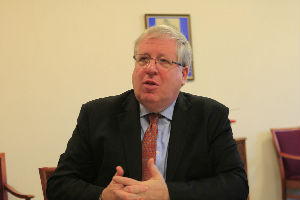Li pledges to strengthen debt audits
Updated: 2013-10-22 23:35
By Chen Jia and Hou Liqiang (China Daily)
|
|||||||||||
Chief auditor says results will be announced objectively, truthfully
China's overall debt level is in a safe and controllable range, Premier Li Keqiang said on Tuesday, pledging to continually strengthen the auditing of loans by local governments to limit potential risks.
"The central government will continue to strictly control the deficit rate," Li said in a speech at the opening ceremony of the 21st International Congress of Supreme Audit Institutions, which opened on Tuesday and runs through Saturday in Beijing.
The fiscal deficit-to-GDP ratio in China is 2.1 percent so far this year, lower than the internationally accepted alarm level of 3 percent.
Based on newly released economic indicators for the third quarter, which showed a rebound from the first half, Li said the government will continue the current fiscal and monetary policies, without expanding the deficit or increasing money supply, to manage liquidity in correspondence with the growth situation.
He stressed that the key to stable economic growth is to improve structural reforms and inject more private capital to stimulate the market's vitality.
Xu Sitao, chief representative of The Economist Group in China, said strictly controlling the deficit means there will be no possibility for the leadership to repeat the huge 4 trillion yuan ($656 billion) fiscal stimulus package that followed the outbreak of the global financial crisis.
"It also reflects the government's determination to de-leverage in the financial system," Xu said. "But it may result in a slower economic growth as fixed-asset investment still remains a main driving force in China's GDP."
The high level of local government debt has become a big issue that may threaten the sustainable development of the world's second-largest economy.
The National Audit Office is now carrying out a survey of local government debt, and its results are due to be released in the next few weeks.
Thousands of officials have been traveling across the country trying to generate accurate estimates of liabilities at the four levels of local government, down to the township level.
The audit's results will be announced "objectively" and "truthfully" according to the law, Liu Jiayi, auditor-general of the National Audit Office, said at a news conference on Monday.
Apart from debts related to State and trade secrets and personal privacy that cannot be made public according to the law, there is no problem with publicizing other debts, Liu added.
He also said the amount of the debt shouldn't be the only aspect that should be considered when looking at local government debt, adding there is no world-recognized debt warning line.
"We should also look into where the debt money is used, the quality of the assets after the use of the debt and local governments' ability to repay the debt," Liu said. "We have the ability to solve the debt issue."
The National Audit Office last counted local government debt at the end of 2010, giving the figure as 10.72 trillion yuan, or 27 percent of GDP.
Economists predict the current local debt may be as high as 30 trillion yuan, equal to more than 60 percent of GDP.
Stephen Green, chief economist in China at Standard Chartered Bank, said local governments need additional sources of financing, which requires deepened fiscal reform.
"China also needs a proper debt monitoring system, an audit of local government assets, and medium-term budgeting," he said.
The International Congress of the Supreme Audit Institutes is held every three years and is the highest authority of the International Organization of Supreme Audit Institutions, which was founded in 1953 and consists of the top auditing bodies of United Nations' member states.
Liu succeeded the auditor-general of South Africa on Tuesday to become president of the International Organization of Supreme Audit Institutions for the next three years.
A total of 686 representatives from 160 countries are participating in the international congress. They will discuss "state audit and state governance" and "the functions of the top audit bodies in keeping the sustainability of fiscal policy" during the five days.
The congress will also pass a declaration to review the achievements and experience of the International Organization of Supreme Audit Institutions over the past 60 years and to explore ways of promoting and improving global governance.
Related Stories
Debt issue can be solved, top auditor says 2013-10-22 17:42
China eyes municipal bonds to clean up local debt 2013-10-21 11:03
Local government debt could exceed $3.3t 2013-09-17 14:35
Govt debt may exceed 15tr yuan 2013-09-10 07:00
Today's Top News
China, Russia reach big oil deal
Apple unveils new Macs, iPad
Officials promote power relations
Home prices rise further in Sept
Big challenges lie ahead for urban planners
Firms urged to contact unions abroad
Smart cities to aid urbanization
UN films highlight rise in HIV cases among women
Hot Topics
Lunar probe , China growth forecasts, Emission rules get tougher, China seen through 'colored lens', International board,
Editor's Picks

|

|

|

|

|

|





